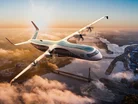The EAG aims to hybridise planes for electric aviation

Proving the importance of electrification is not necessary. Every industry is already making changes to become more sustainable, and the transport industry is pushing its adoption of electric propulsion into overdrive. The market is creating space for electrification and aviation is no exception, which is why the Electric Aviation Group (EAG) was formed.
As a consortium of aerospace companies, the EAG is focused on promoting the developments and benefits for electric power in the industry. This places the participating companies in a unique position to partner with other leaders in the aviation sector to make positive changes.
Next steps in zero-emission aviation
One of those will be hybrid-electric transport as the consortium works together to develop a British-built 70+ seater hybrid-electric aeroplane that will produce zero emissions. The demand for this is reflected in the EU Flightpath 2050 targets, which involve reducing carbon dioxide emissions by 75% by 2050, as well as nitrogen oxide emissions by 90% and noise levels by 65% in the same period.
The Hybrid Electric Regional Aircraft (HERA) will be designed to meet these targets as of 2028 when the aircraft is set to be delivered. Leveraging technology for short take off and landing (STOL), the aircraft will be suitable for logistics firms to shift cargo and will be pitched to Amazon Air, FedEx, UPS and the like. The ability to fly silently will open up new opportunities for night-time deliveries as the aircraft proves minimal disruption to residential areas surrounding drop-off points.
Energy conservation will also be a key feature of the aircraft. Deploying a Potential Energy Recovery System (PERS) will allow battery-neutral operation, meaning no charging infrastructure is required.
Competition in the aviation industry
There seems to be a lot of development happening in aviation right now, but we’re yet to see a match for sustainable aviation fuel (SAF). The likes of Rolls-Royce and Eviation are taking strides to electrify air travel, but right now the more feasible step is hybrid. As a result, organisations like ZeroAvia, based at the popular UK aircraft site at Duxford, UK, are entering the market through partnerships to decarbonise aircraft solutions in the lead up to all-electric propulsion.


